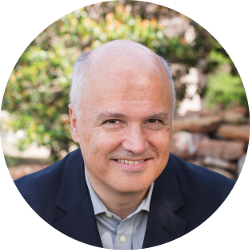Are we about to be overthrown by our own creations?
You may have seen headlines of late predicting that developments in artificial intelligence (AI) will one day lead to machines taking over. Computers can already calculate faster than we can. Coupled with mechanical systems, they have the potential to be stronger, faster, more efficient, and in some cases, more lethal.
Some worry that our creations will do to us what we too often do to each other.
But for computers to stand up and overthrow their creators they would, at a very minimum, have to be imbued with free will. The ability to choose to do something other than what their creators programmed them to choose.
Is that even possible?
While I think that’s an interesting question (the answer is no, but that’s a topic for another day), I’m much more intrigued by the counter-question: What would we look like if we didn’t have free will?
Let’s assume for the sake of this discussion that we’re created beings. Like the computers and robots we’ve created (and deign to believe we can one day imbue with independent creativity), we were created by some other creator who did, in fact, instill in us the freedom to choose.
How would we be different if he hadn’t given us free will? What if we could only choose what he programmed us to choose?
I think it’s safe to say that we wouldn’t be over-eating and under-exercising. Or under-sleeping.
And I think it would cut down a lot on murder. And violence in general. How much sense would it make for a creator to program one of his creations to start destroying a bunch of his other creations? If he didn’t like the other creations, wouldn’t he just unplug them? (And whatever happened to all those dinosaurs?)
Politics and government would be completely unnecessary. Allocation of resources? Rule of law? Level playing field? It’s all in the program.
Sound pretty good so far?
Does your spouse love you?
What does that even mean if there’s no free will? She does what she does because the program says she must.
“These three remain: faith, hope, and love.” (1 Corinthians 13:13, NIV) They all have their root in free will. Without it, the actions may still exist, but the meaning is lost.
Without free will, the actions are attributable to the creator, not the creation. It is the creator who loves me, not my wife.
But think about this. Can I even understand what love is if I don’t have free will? If my own actions are directly attributable to the creator’s programming, so, I will naturally assume, are the actions of others. I’ve lost the capacity to understand their actions as an expression of their free choice—because they haven’t any. And thus I’ve lost the capacity to understand the actions of the creator as anything other than natural consequence.
I couldn’t love God if he hadn’t given me free will. On the one hand I wouldn’t know what love was, and on the other I wouldn’t have the capacity to express it.
We often ask how a good God can allow so much bad to happen in the world. I think this is the core of the answer. He wanted us to know what love was. He wanted us to experience love for each other. He wanted us to have the capacity to understand the depth of his love for us. And he wanted us to be able to genuinely and sincerely express love back to him.
It is true that without free will, evil cannot exist. But neither can good.
One final thought I’ll leave with you … How realistic is it to believe we could ever exceed the one who created us?
Okay, maybe two … How would we feel if our creations rebelled against us the way we’ve rebelled against our creator?
